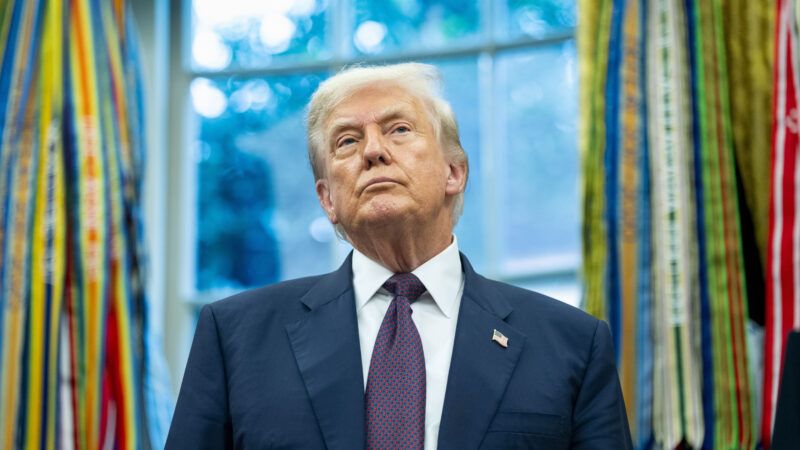Federal Appeals Court Says Trump's Tariffs Are Unlawful, Allows Them To Remain in Place
Trump went "beyond the authority delegated to the President," the court ruled, but it vacated an injunction that could have provided immediate tariff relief to American businesses.

President Donald Trump overstepped the limits of executive authority when he used emergency powers to levy tariffs, a federal appeals court ruled on Friday.
That decision, from the U.S. Court of Appeals for the Federal Circuit, is the latest in a string of legal losses for Trump's tariffs, which were previously ruled unlawful by the Court of International Trade (CIT) and a federal district court. In the 7-4 ruling handed down Friday, the majority upheld the CIT's decision that the International Emergency Economic Powers Act (IEEPA) did not authorize a president to impose tariffs.
"We agree that IEEPA's grant of presidential authority to 'regulate' imports does not authorize the tariffs imposed by the Executive Orders," wrote court ruled. The majority opinion says that Trump's tariffs would "assert an expansive authority" that is "beyond the authority delegated to the President by IEEPA."
Friday's ruling will almost certainly be appealed to the Supreme Court.
"The decision today is a powerful reaffirmation of our nation's core constitutional commitments from our nation's Founders, especially the principle that Presidents must act within the rule of law," Neal Katyal, an attorney with the Liberty Justice Center, which represented some of the plaintiffs in the case, said in a statement.
Trump administration used IEEPA in February to slap tariffs on imports from Canada, China, and Mexico. The Trump administration again invoked IEEPA to impose its so-called "Liberation Day" tariffs in early April, which included a universal 10 percent tariff on all imports and higher, country-specific tariffs, some of which went into effect in August after being delayed several times.
As seemed evident during oral arguments, the court's majority was deeply skeptical of the government's claim to broad powers that are not spelled out in the IEEPA law, which notably does not contain the word "tariff."
If the government's interpretation of the IEEPA statute is correct, the court ruled, that would create "a functionally limitless delegation of Congressional taxation authority." Elsewhere in the ruling, the court said that such a delegation of taxation power would be unconstitutional, even if that were what Congress intended to do.
In short, the Trump administration's argument for using emergency powers to impose tariffs fails on multiple fronts.
However, the appeals court struck down an important aspect of the CIT's earlier decision: its permanent, universal injunction that blocked the tariffs from being collected.
That injunction was in place for mere hours in May before it was paused by the appeals court, pending the outcome of its review of the underlying case. In Friday's decision, the appeals court vacated that part of the CIT's ruling and ordered the lower court to review that portion of the case in more detail.
That leaves the tariffs in a chaotic state of limbo. Three courts have now ruled that they were unlawfully imposed, and yet they will remain in place (at least for now).
That's an outcome that seems to create even more uncertainty for American businesses that are bearing the brunt of the tariffs. Rather than providing relief in the form of a new or renewed injuction, the appeals court has effectively said that Trump is illegally taxing nearly all imports into the country and that Americans will have to continue paying those taxes while the rest of the legal process plays out.
Rather than wait for that to happen, Congress should now get involved. It's clear that Trump's tariffs do not have the legal standing to survive in the long term, and lawmakers could save everyone a lot of pain by cancelling the economic emergency that underpins the tariffs.
